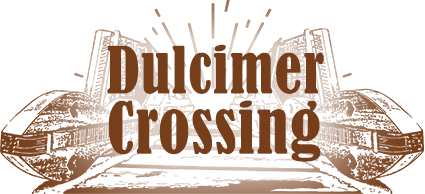Blog
Back 2 School Special!
It is that time of year again, when we change our rhythms, get out the school clothes, take pictures of the first day of school, and pick up our instruments to play them after our summer vacations. Here at DulcimerCrossing.com, we want to help you further develop your skills and enjoyment in making and sharing the music in your soul. So we have a deal for you!
We've added new teachers, we've got lessons for both mountain and hammered dulcimers, we've got lessons for dulci-bro (slide dulcimer…
Chromatic Mountain Dulcimer--The Dark Side?
"traditionalists" who argue for a standard diatonic dulcimer ("I don't want no extra frets bygummit!");
"neo-traditionalists" who argue for a modified diatonic dulcimer with a 6+ fret ("well it is pretty standard these days");
"practical-neo-traditionalists" who are supporters of multi-modified diatonic dulcimer with 6+ AND 1+ frets; ("but I NEED that extra fret to play C and F chords!")
"people on the DARK side" who are supporters of entirely chromatic mountain dulcimers. …
Benefits and Limitations of Different Tunings on Mountain Dulcimer? Part 1
Practicing in the Dark
by Linda Ratcliff
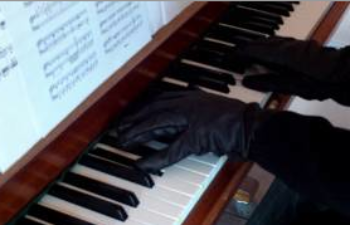
I'm spending the winter in sunny California, but I know many of you have been getting hit with some pretty cold weather. Brrrr. That reminds me of the way I used to practice piano. I usually arrived at school, during both my high school and college years, at about 6:30 in the morning, and I always went straight to the practice rooms. Now the school didn't turn on the heaters full blast until about 7:30 a.m., so to challenge myself (and because no one was looking), I would st…
What is Drone Style?
Once we have learned the melody of a tune we can begin adding notes in order "fill out" the sound of the tune. The easiest way to do this is to play "drone style". This is actually the traditional way to play the old mountain dulcimers which did not have frets that extended all the way across the fretboard, but only were present under the melody strings.

On the mountain dulcimer, the player plays the melody on the string(s) which are required for the melody and simply strums all…
Koto--the Japanese Cousin of the Mountain Dulcimer
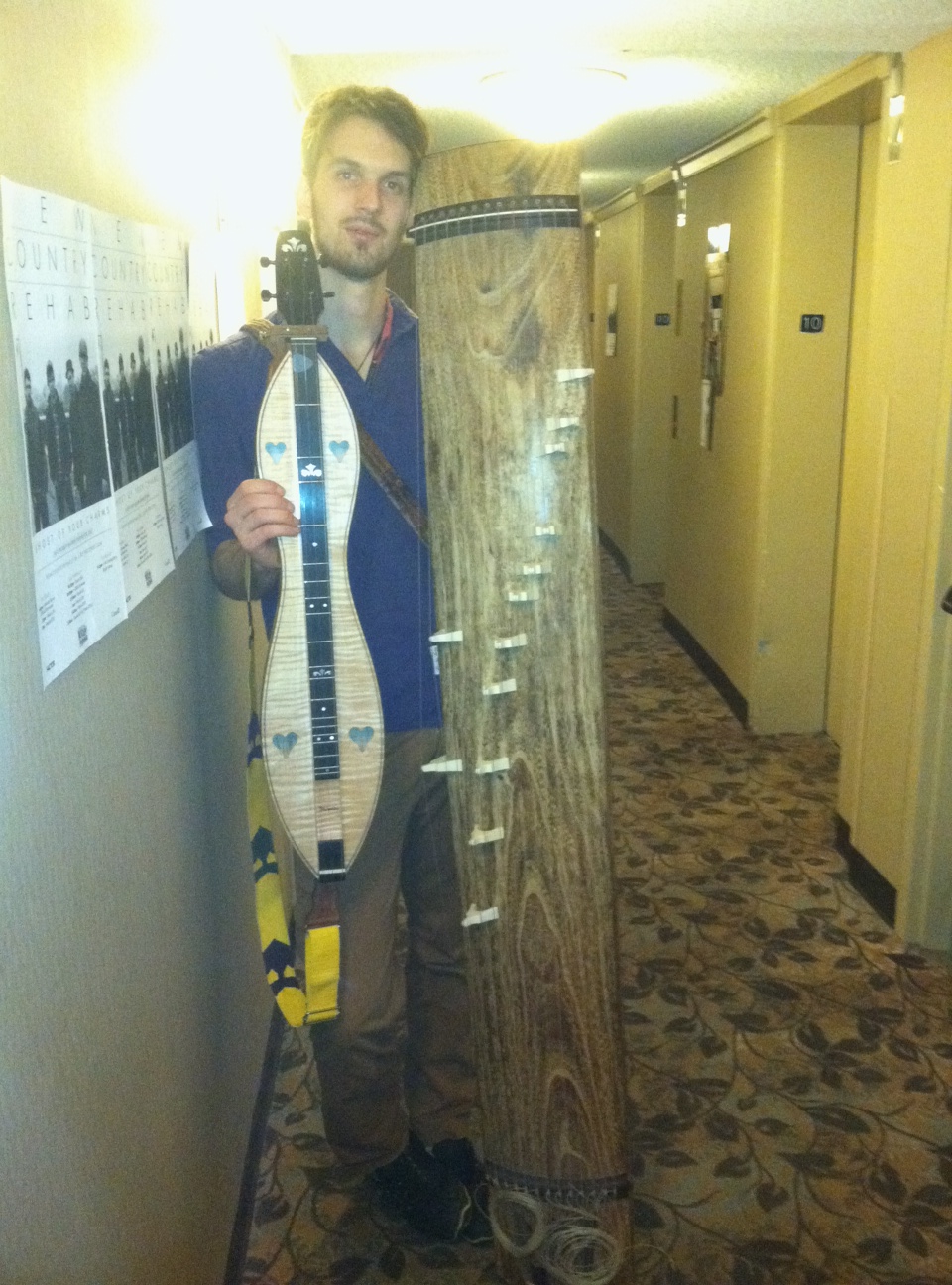 I thought I had caught a glimpse of this long, distinctive instrument while passing by one of the Private (Guerilla) Showcases on the music floor of the Delta Chelsea Hotel in Toronto, but it wasn't until I was rewarded by meeting its owner in the hall in the early evening (before all the craziness of the late-night schedule of "concertettes" begins) that I was certain.
I thought I had caught a glimpse of this long, distinctive instrument while passing by one of the Private (Guerilla) Showcases on the music floor of the Delta Chelsea Hotel in Toronto, but it wasn't until I was rewarded by meeting its owner in the hall in the early evening (before all the craziness of the late-night schedule of "concertettes" begins) that I was certain.It WAS a Japanese Koto, in the hands of (and nearly as tall as) a Londoner who, after exploring his music degree…
What is Melody-Only Style?
When we are playing the melody of a tune, without adding any chords, bass notes, harmony notes or drones, this is playing our dulcimers like they are melody-only instruments like flutes, trumpets, clarinets or trombones. This way of playing focuses on the melody and doesn't have the distraction of other notes.
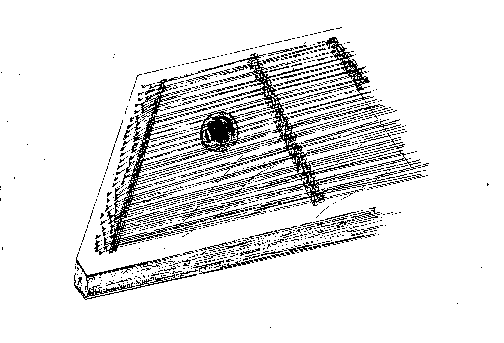
On the hammered dulcimer, the player is playing only the melody of the tune.

On the mountain dulcimer, the player is playing on the string(s) which are required for the me…
New Hammered Dulcimer Instructor!
We are pleased to introduce Bill Robinson our newest Hammered Dulcimer Instructor at DulcimerCrossing.com!
Teaching the Old-Time Tunes...for fiddle!
Part 2 of the Update 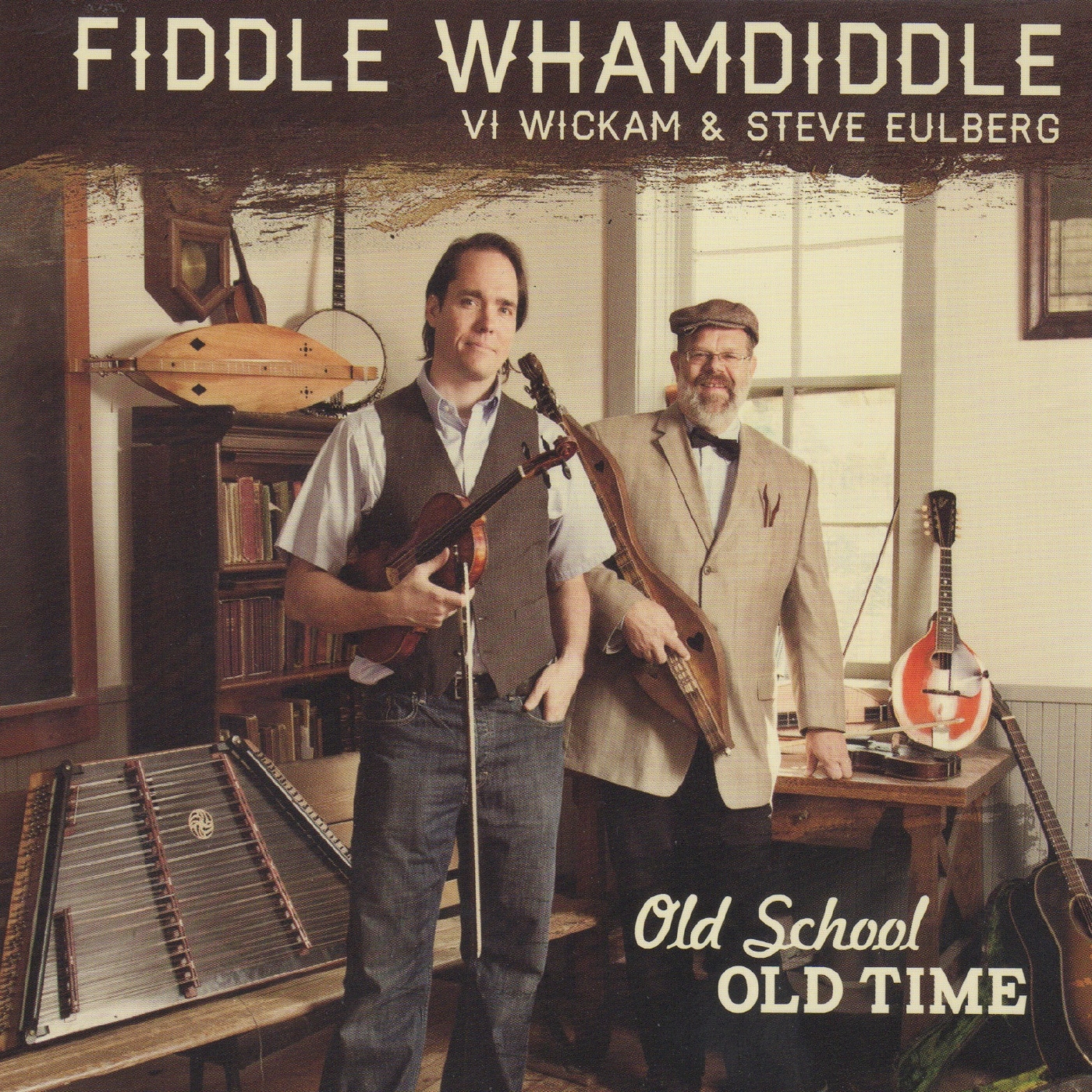 Now you already KNOW that DulcimerCrossing teaches lessons for both kinds of dulcimer, but did you know that the tunes on the Old School Old-Time FiddleWhamdiddle CD are being taught for fiddle players on Vi Wickman and Matthew Hartz's MyTalentForge.com? If you don't play fiddle, please pass this on to your friends who do!
Now you already KNOW that DulcimerCrossing teaches lessons for both kinds of dulcimer, but did you know that the tunes on the Old School Old-Time FiddleWhamdiddle CD are being taught for fiddle players on Vi Wickman and Matthew Hartz's MyTalentForge.com? If you don't play fiddle, please pass this on to your friends who do!
Fiddle Whamdiddle CD Old School Old-Time

Psst...Here is part 1 of the update I promised you.
Vi and I recorded and released a recording of some of our favorite Old-Time tunes in December. Old School Old-Time is what we call it...and we even got to do our photo shoot in the oldest one-room schoolhouse in Larimer County, Colorado--the Upper Box Elder School!
We had a foot-stomping, hootin and hollerin' good time at Avogadro's Number in Fort Collins as a CD Release party, and now we're getting the word out about the CD.
Some people like it b…
Categories
- News (6)
- Events (4)
- subscriber news (236)
- uncategorized (6)
- lessons (190)
- mountain dulcimer (203)
- hammered dulcimer (157)
- history (22)
- music theory (40)
- octave (1)
- plagal cadence (1)
- dulci-bro (73)
- fingerpicking (3)
- fingerstyle mountain dulcimer (4)
- nina zanetti (5)
- aeolian (2)
- dorian (4)
- ionian (3)
- lydian (1)
- mixolydian (3)
- modes (2)
- traditional (2)
- tuning (5)
- music education (2)
- NSME (1)
- standards (1)
- drone (3)
- folk alliance (1)
- jonah brody (1)
- koto (1)
- sam lee (1)
- scottish folk song (1)
- linda ratcliff (5)
- practice (29)
- chromatic mountain dulcimer (66)
- dulcimercrossing.com (2)
- erin rogers (7)
- building (8)
- black mountain (1)
- jerry read smith (1)
- Joshua Messick (1)
- song of the wood (1)
- don pedi (5)
- fiddle whamdiddle (9)
- miss mcleod (2)
- steve eulberg (30)
- vi wickam (9)
- buying (1)
- choosing (1)
- purchasing (1)
- orphan girl (1)
- copyright (1)
- amplification (2)
- contact pickup (1)
- eulberg (4)
- microphone (2)
- pickup (2)
- berkeley (1)
- colorado (2)
- festivals (4)
- kentucky (1)
- scholarship (1)
- western carolina (1)
- noter (2)
- clubfooted jib (1)
- dgd (2)
- dgd tuning (1)
- special event (31)
- david massengill (2)
- reverse ionian (1)
- chuck boody (1)
- concertina (1)
- deedee tibbits (1)
- dulcimer (7)
- evart (1)
- evart funfest (1)
- linda foley (1)
- michigan (1)
- original dulcimer players club (1)
- fingerstyle (11)
- gebhard woods (1)
- technique (1)
- harmonics (1)
- dan delancey (2)
- june apple (1)
- linda thomas (3)
- modal (1)
- expression (1)
- playing expressively (1)
- dulcimer pledge (1)
- christmas (2)
- nativity (1)
- DAC (2)
- minor more (1)
- mississippi sawyer (1)
- holiday (5)
- joy to the world (1)
- jingle bells (1)
- reverse ionion (1)
- hand independence (1)
- hand separation (1)
- lullabye of muffe (1)
- tina gugeler (1)
- absolute beginner mountain dulcimer (1)
- beginner (2)
- mountain (3)
- string-side up (1)
- absolute beginner hammered dulcimer (1)
- blog (2)
- dulcimercrossing. (1)
- topics (1)
- blues (4)
- resonator (4)
- dulcimer orchestra (2)
- kitty puss (1)
- mike clemmer (1)
- noter style (2)
- jam survival (7)
- butch ross (3)
- looping (1)
- intro (4)
- neal hellman (4)
- erin mae lewis (9)
- rehearsal (3)
- italian (1)
- lauda (1)
- irish (1)
- slipjig (1)
- rhythm (2)
- robert force (2)
- tuner (1)
- exercises (1)
- scales (1)
- devotions (3)
- hark advent (1)
- the glad sound! (1)
- chords (3)
- chromatic (4)
- erin (1)
- theory (7)
- advent (5)
- preparation (4)
- stir up (1)
- appalachia (4)
- hillbilly (1)
- mountains (1)
- traditional music (1)
- dampers (1)
- hearts of the dulcimer (3)
- patricia delich (2)
- wayne jiang (2)
- appalachian (1)
- John Jacob Niles (1)
- Live Events (28)
- Premium Level Membership (2)
- habits from the muse (1)
- progress (6)
- support (2)
- Anna Muckova (1)
- cimbalom (1)
- CWA (1)
- Czech Republic (1)
- Magdalena Muckova (1)
- nonsuch (1)
- Slovak Republic (1)
- podcast (1)
- aubrey atwater (2)
- jean ritchie (2)
- log-in (1)
- update (1)
- lucky (1)
- performance (9)
- preparing (1)
- study (1)
- dulcimers (1)
- wendy songe (2)
- bluegrass (2)
- growth (1)
- resolutions (2)
- risks (1)
- capo (1)
- snark (1)
- fiddle (61)
- criticism (2)
- judy klinkhammer (1)
- miles davis (2)
- wrong note (1)
- live and let live (1)
- style (1)
- barlow knife (1)
- old school old-time (2)
- marie kirby (1)
- bass mountain dulcimer (1)
- elaine conger (1)
- larry conger (1)
- practice smarter (8)
- musical journey (1)
- piano (1)
- calm (1)
- dog (1)
- su la li (1)
- bluebird cafe (1)
- inspiration (3)
- new input (2)
- trust (1)
- practice space (2)
- quite (1)
- how to practice (8)
- you are what you practice (1)
- workshop (5)
- rich chords (2)
- kaitlin pabo-eulberg (1)
- hooked on dulcimers (1)
- humor (1)
- blue water thinking (1)
- creativity (2)
- environment (2)
- original tunes (1)
- 1+ fret (1)
- chopin (1)
- classical (1)
- assessment (1)
- skill levels (1)
- waltz (1)
- caledonian club (1)
- ensemble (1)
- group (1)
- dulci-tune (1)
- tuning game (1)
- love (2)
- workout (1)
- learning (8)
- teacher (6)
- self-taught (1)
- how long (1)
- jam sessions (6)
- learn to play (1)
- strategies (2)
- fariña (1)
- mimi (1)
- pete seeger (2)
- rainbow quest (2)
- goals (1)
- planning (1)
- backing tracks (6)
- matthew dickerson (2)
- concert (1)
- erin mae (2)
- guitar (5)
- deborah hamouris (3)
- dj (2)
- freight and salvage (1)
- classic (1)
- licks (1)
- rock (1)
- berkeley dulcimer orchestra (1)
- premiere (1)
- banjo (1)
- frank proffitt (1)
- frank warner (1)
- tom dooley (1)
- baker (1)
- binding (1)
- blue lion (1)
- bob (1)
- gluing (1)
- janita (1)
- live (1)
- tips (1)
- spouse (1)
- amplified (1)
- DI box (1)
- digital interface (1)
- sound reinforcement (1)
- 2nd Set Concert (2)
- contest (1)
- flash mountain dulcimer brigade (2)
- JimJim & the FatBoys (1)
- Pecan Grove (1)
- walnut valley festival (2)
- winfield (1)
- wvfest (1)
- thinking (1)
- case (1)
- cross-legged (1)
- grip (1)
- safe dulcimer (1)
- sit (1)
- slip (1)
- stand (1)
- stool (1)
- strap (1)
- learn (3)
- mistakes (1)
- successes (2)
- herbie hancock (1)
- improvising (1)
- jazz (2)
- lois hornbostel (2)
- wrong chord (1)
- atlantic (1)
- barbara allen (1)
- frank profitt (1)
- scots-irish (1)
- chord wizard (1)
- diatonic (2)
- equi-distant (3)
- tom strothers (1)
- tool (2)
- busker (1)
- tsimbaly (1)
- ukraine (1)
- ukrainian (1)
- calendar (1)
- schedule (1)
- baritone (1)
- concert window (3)
- katie moritz (1)
- faq (1)
- frequently asked questions (1)
- logged in (1)
- navigation (1)
- old time (1)
- patreon (1)
- shape-note (1)
- special (1)
- carrell (1)
- geoff reeve-black (1)
- malvern (1)
- presnell (1)
- articulations (1)
- chicken reel (1)
- conger (1)
- soldier's joy (1)
- basic level membership (1)
- caring for your instrument (1)
- winter weather (1)
- god rest ye (1)
- rhythmic displacement (1)
- builder (1)
- tam kearney (1)
- toronto (1)
- don neuhauser (1)
- slide (1)
- ashley ernst (1)
- dan and angie landrum (1)
- dpn (1)
- dulcimer players news (1)
- dulcimersessions.com (1)
- maddie macneil (1)
- arkansas traveler (1)
- Mark Alan Wade (2)
- 3d playing (1)
- playing across the strings (2)
- chord symbols (1)
- understanding chords (3)
- dulcimer club (1)
- class (1)
- habits (1)
- skills (1)
- jimmy driftwood (1)
- failures (1)
- hours (1)
- youtube (1)
- arranging (1)
- bill robinson (1)
- cold winter night (1)
- karen mueller (3)
- jig (1)
- DAd tuning (1)
- hyfrydol (1)
- hymn (1)
- 2020 (1)
- premium (1)
- gounod (1)
- hitchcock (1)
- dan evans (1)
- spotted pony (2)
- steveeulberg (1)
- nylon-string (1)
- stephens lutherie (1)
- musical devotions (1)
- award (1)
- fernando sor (1)
- hammered (1)
- understanding (1)
- lent (1)
- leap forward (1)
- power of music (2)
- News (10)
- Events (4)
- mountain dulcimer (147)
- hammered dulcimer (151)
- chromatic mountain dulcimer (8)
- sharing (1)
- persistence (5)
- Practice (4)
- routine (1)
- tour (1)
- new website (1)
- arrranging (1)
- celtic (1)
- single jig (1)
- mountain dulcimer (3)
- busking (1)
- audio (1)
- playback (1)
- protection (1)
- adaptations (1)
- dulcimer acquisition syndrome (1)
- dulcimer acquisition disease (1)
- contests (1)
- lessons (1)
- identify (1)
- apps (1)
- motivation (1)
- hands (1)
- In Memoriam (1)
- guitar (1)
- archive (1)
- concerts (1)
- mountain dulcimer (2)
- hammered dulcimer (1)
- lessons (1)
- workshops (1)
- self-assessment (1)
- learn (1)
- greek (1)
- mindset (3)
- accountability (2)
- encouragement (1)
- prodding (1)
